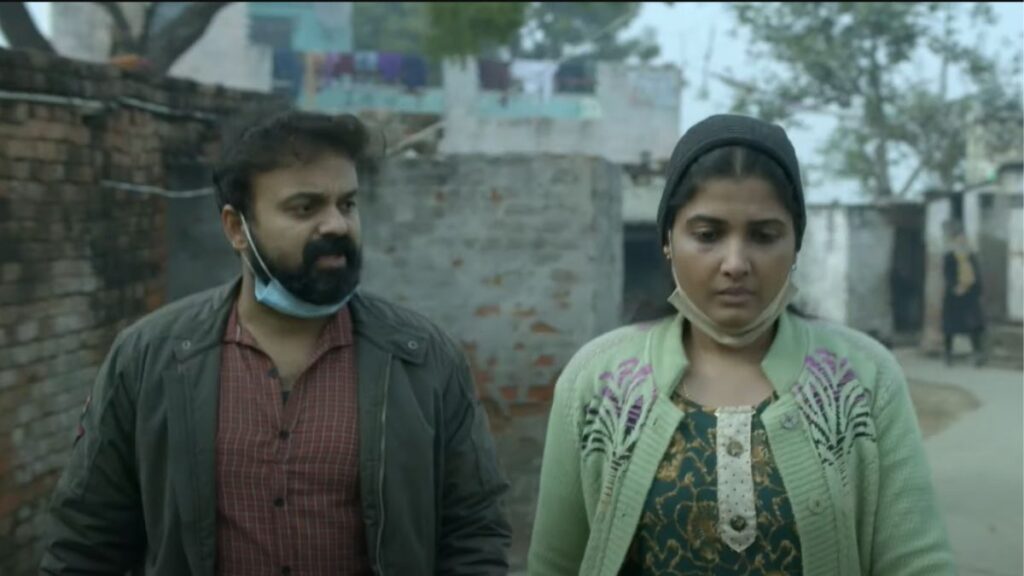After making a splash at various international film festivals, Malayalam filmmaker Mahesh Narayanan’s latest outing, Ariyippu (
Declaration, 2022), is currently streaming on Netflix. The film is an exploration of ethics and integrity and how they conflict with one another when personal stakes become higher.
Ariyippu is set in Noida at a time when the COVID-19 related rules and regulations have been relaxed but wearing a mask at the workplace is a requirement. Hareesh (Kunchacko Boban) and his wife, Reshmi (Divya Prabha), are a Malayali couple, who have left their home in Kerala to pursue a better future. They work in a rubber factory that specializes in making latex medical hand gloves. One day at work, Reshmi notices the presence of used gloves in a fresh lot and reports it to a senior female supervisor (Loveleen Mishra). Expectedly, this stirs a hornet’s nest. But in an unpleasant turn of events, a tempered video of Reshmi starts circulating amongst her colleagues in the factory thereby causing havoc in her life with Hareesh. As secrets and misunderstandings come to the surface, the couple’s relationship’s is severely put to the test…
Ariyippu begins with shots of a ‘skill’ video featuring Reshmi working at the factory. It is shot by Hareesh as a part of their procedure to acquire a visa. Right from the beginning of the film, Narayanan prepares us to enter into a world that ditches conventional plot structures for a deeper psychological journey. His way of examining the compunctious domain of his narrative is dynamic and subsequently, complex and multi-layered. Having the characters in the film to wear a mask for most of their screen time implies their camouflaged nature, which will eventually result in a succession of terrible, unintended consequences throughout the film. The wedding ring that Reshmi cannot remove at her workplace (as a part of the regulations of her factory) serves as a symbol of her relationship with Hareesh, where she does not have much say and is metaphorically struck with. Moreover, making the characters of the film to speak in their native language – people from Kerala converse in Malayalam and those from the North in Hindi – accentuates the authenticity within the film.
Narayanan highlights the misogyny faced by women in multiple ways by the men invading the sphere of the film. The key decisions in the factory as well as in the home are made by the man. When the female supervisor observes a faulty situation in the factory and reports it, Dinesh Singh (Faizal Malik), a senior official, reprimands her instead. When the seed of doubt is planted in Hareesh’s mind, he physically abuses Reshmi. In one of the film’s most horrific scenes, he forces himself upon Reshmi without caring about the presence of their female colleague sleeping with her kid nearby. The police officer (Sidharth Bhardwaj), while watching the clip, steals a lecherous glance at Reshmi who is present with her husband.
The film scores in terms of technical virtuosity. It is visible in the way ace cinematographer Sanu John Varughese’s gliding hand-held camera takes in the dishevelled rooms and invades the constrained space of the factory with a casualness. Varughese and Narayanan set up an enormously complex and involving set of relationships between the characters by continually framing and reframing them while displaying how the camera can also operate as a sentient and efficacious instrument. Narayan an and his co-editor, Rahul Radhakrishnan, draft the scenes in the film in such a pattern that none of them overstays their welcome. The downplaying of the various events in the film is foregrounded with a seamless flow that keeps us riveted throughout. With multiple layers of ambient sound and the incessant running of machines that cease to pause, Vishnu Govind creates an aural ambience that grips us with a sense of entrapment that enhances the mood and narration of the film. The production design by Jotish Shankar has diligent attention to minute detailing that gives a genuineness to the look and feel of the film while Sushin Shyam’s background score works perfectly in infusing the grimness in the mood of the film.
Coming to the performances, Kunchacko Boban brings an impressive force to his performance. As the shades of his characters get darker, he displays a compelling sagacity in keeping with the stark reserve of the society in which he exists. Divya Prabha brings a sensitivity in her portrayal of a woman trapped in the vortex of conflicts. Despite all of the restraints put on her character, her judicious choices give grace and depth to her role. Kannan Arunasalam as a friendly and negotiating senior employee, Suresh Sir, brings a fine balance to his character with impressive strength. Loveleen Mishra as an honest individual brings a courage to her character and maintains her uprightness in a workplace surrounded by dominating men while Danish Hussain as in his brief presence also does a commendable job as the owner of a factory with a calm and manipulative interior.
Ariyippu is easily one of the best and bravest films of the year. Don’t miss it.
Malayalam, Hindi, Drama, Color


